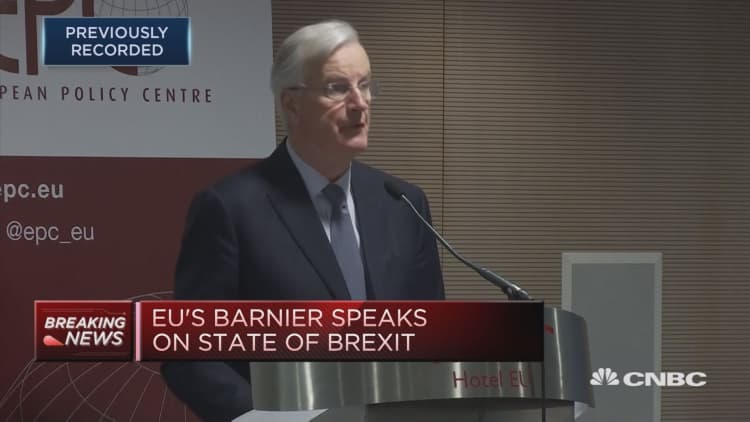Brexit may look like a confused mess for many, but the big banks are still making calls.
The U.K. Prime Minister Theresa May has seen her preferred deal with Europe rejected three times, but the very same U.K. lawmakers that voted it down have themselves failed twice to agree on any alternatives.
On Tuesday, May called an extended meeting of her senior ministers to try to formulate a plan as the clock ticks down to Europe's next deadline — April 22.
Whether the government heaves toward a no-deal departure, calls a snap general election, works out a softer Brexit or doesn't even leave the European Union are all given similar credibility.
CNBC takes a look at what Wall Street thinks will happen next.
Goldman Sachs
Goldman Sachs said Brexit has cost the U.K. £600 million ($783 million) a week since the 2016 referendum, with economic growth declining by around 2.5 percent.
"The resulting uncertainty over the future political and economic relationship with the EU has had real costs for the U.K. economy, which have spilled over to other economies," Goldman analysts said in a note to clients this week.
The bank also sees a 15 percent chance of a no-deal Brexit which would cause a 17 percent decline in the pound.
The bank has assigned a 35 percent probability of Brexit not happening at all.
J.P. Morgan
The inability of lawmakers, so far, to forge a clear path forward has given May a tiny bit of wiggle room to potentially return to the Houses of Parliament with a fourth shot at getting her provisional agreement over the line.
With parliamentary convention dictating that the vote may have to somehow differ in substance from previous attempts, the bank suggests there could be a run-off vote against another option.
Of the alternatives that lawmakers have been looking into, J.P. Morgan predicts Parliament will coalesce around a single "softer Brexit" option this week.
The bank's greatest probability is a general election at 30 percent, with May's agreement or a long extension to the U.K. exit placed at 20 percent. A second referendum or a no deal are both the least likely options at 15 percent each.
Citi
Citi doesn't indicate preferences or probabilities to any Brexit outcome.
However, the bank is not alone in noting that the ruling Conservative Party appears to be hardening toward a "no-deal" Brexit.
Around 200 Conservative lawmakers have reportedly signed a letter to the prime minister demanding a "managed" no-deal exit. But Citi still expects the U.K government to back away from the cliff edge.
The bank noted that a general election would only increase uncertainty and would possibly strengthen the hand of the separatist Scottish National Party (SNP).
On the prospect of May returning her vote to Parliament, Citi believes it would once again be defeated.

Deutsche Bank
The chances of Britain crashing out of the European Union without a deal on April 12 have increased to one in four, according to Deutsche Bank.
The German lender said Monday that it was now bearish on the pound as confusion over the U.K.'s withdrawal from Europe continued.
The bank raised its estimate for the chances of a no-deal Brexit to 25 percent from 20 percent and is targeting an exchange rate of 90 pence per euro. On Monday, the euro was buying 85.61 pence.
Deutsche's base case scenario, which holds a 30 percent probability, is that any consensus agreed by Parliament will fail to be enacted by the government and a general election will be required.
In its note, Deutsche said new elections should not be viewed positively and not just because of the potential for a left-wing Labour government.
"More relevant, in our view is the fact that polling suggests the result could be similar to that in 2017, which has led to the current parliamentary deadlock," said Deutsche Bank macro strategist, Oliver Harvey.
UBS
Swiss giant UBS uses its latest Brexit analysis to suggest that an early general election in the U.K. may now be inevitable.
Elections in the U.K. are now held every five years unless there is a vote of no confidence in the government or two-thirds of lawmakers vote in favor of holding one.
UBS thinks the latter scenario could be possible as Conservative lawmakers gamble that they could increase their level of support at the ballot box, allowing a greater mandate for May to pass her Brexit deal.
UBS analysis of swing seats has suggested a Brexit-focused election could be of greater help to the Conservatives than the opposition Labour party.


